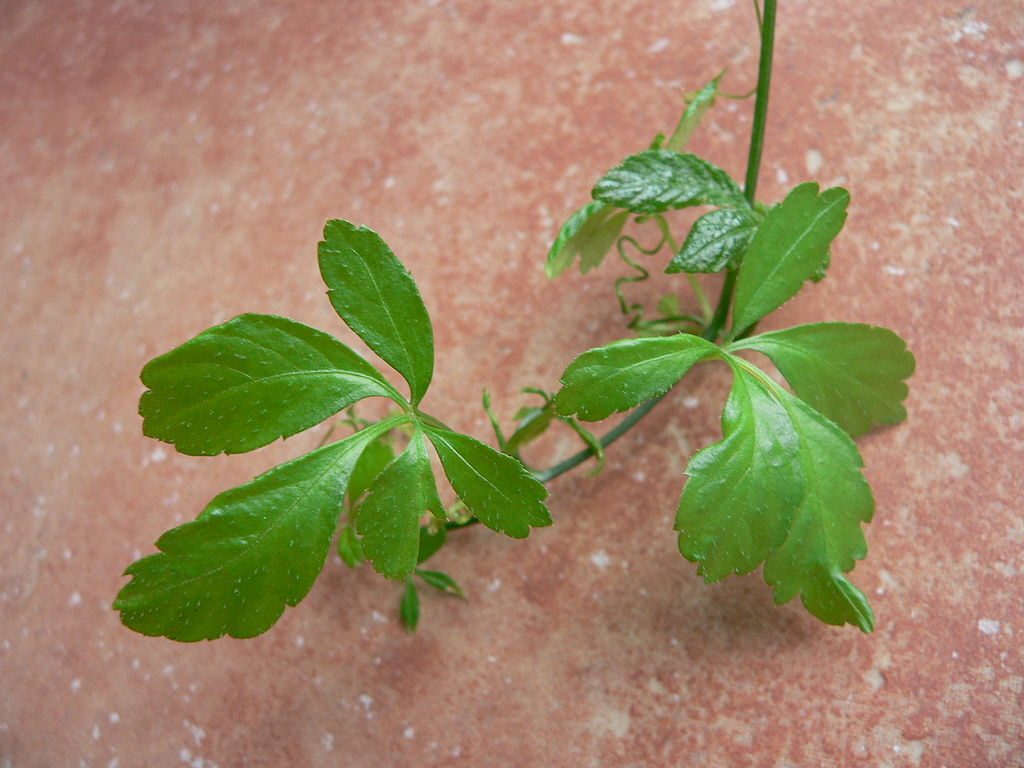 Jiaogulan (Gynostemma pentaphyllum) is a member of the gourd or Cucurbitaceae family of plants that also contains squash, cucumbers, melons, pumpkin and zucchini. Jiaogulan is native to parts of East Asia including Vietnam, Korea, China and Japan. The plant is a creeping climbing vine, which is characterised by serrated leaves and a purple gourd (inedible fruit). Jiaogulan is used in traditional Chinese medicine for its adaptogenic properties, and in this respect can be thought of as similar in effect to other adaptogenic herbs including Panax ginseng, Withania (ashwagandha), mimosa, sour date, rhodiola, Siberian ginseng, brahmi, and gotu kola. Some of the health effects of jiaogulan include general antioxidant and anti-stress effects, which are common to most adaptogens. Studies also indicate that Jiaogulan has blood pressure normalising, cardioprotective, cholesterol normalising, and anti-diabetic effects. As with other adaptogenic herbs, jiaogulan may also have particular anti-anxiety and antidepressant effects. These effects may relate to the triterpene saponins and flavonoids contained within the plant.
Jiaogulan (Gynostemma pentaphyllum) is a member of the gourd or Cucurbitaceae family of plants that also contains squash, cucumbers, melons, pumpkin and zucchini. Jiaogulan is native to parts of East Asia including Vietnam, Korea, China and Japan. The plant is a creeping climbing vine, which is characterised by serrated leaves and a purple gourd (inedible fruit). Jiaogulan is used in traditional Chinese medicine for its adaptogenic properties, and in this respect can be thought of as similar in effect to other adaptogenic herbs including Panax ginseng, Withania (ashwagandha), mimosa, sour date, rhodiola, Siberian ginseng, brahmi, and gotu kola. Some of the health effects of jiaogulan include general antioxidant and anti-stress effects, which are common to most adaptogens. Studies also indicate that Jiaogulan has blood pressure normalising, cardioprotective, cholesterol normalising, and anti-diabetic effects. As with other adaptogenic herbs, jiaogulan may also have particular anti-anxiety and antidepressant effects. These effects may relate to the triterpene saponins and flavonoids contained within the plant.
For example, in one study mice were exposed to a number of forms of experimental stress. The stress caused significant changes in the behaviour of the mice, but these changes were reversed in a group of mice who were administered jiaogulan extract for 14 days. In addition, the stress caused a reduction in the dopamine and serotonin levels in the brains of the mice, and again these effects were reversed in a group of mice who were administered jiaogulan extract for 14 days. The authors observed that jiaogulan extract was able to significantly reduce the cortisol levels in the animals. Jiaogulan extract was also able to reduce elevated levels of a protein called c-fos in the brains of the mice. Elevated levels of c-fos are associated with poor cellular and health outcomes. Therefore the beneficial mood elevating effects of jiaogulan may derive from a general effect that lowers the response to stress. This normalisation of stress may then lead to normalisation of disrupted neurotransmitter levels, including dopamine and serotonin.

Jiaogulan is used as a herbal tea in China in order to combat general stress. The active phytochemicals in jiaogulan are thought to be a group of triterpene saponins called gypenosides. These include a large number of structurally similar terpene derivatives including gynosaponin TN-1, gynosaponin TN-2, gypenoside XLV, and gypenoside LXXIV. Eight of the terpene saponins in jiaogulan are the same as the panaxadiol-type of terpene saponins in Panax ginseng. This similarity in structure for some of the terpene saponins may explain the similarity in effects between jiaogulan and ginseng extracts. Jiaogulan may also contain a number of other phytochemicals including flavonoids. A number of flavonoid subclasses including flavones and flavonols have been shown to possess mood elevating effects in humans and animals. Jioagulin is known to contain the flavonol ombuin, the flavonol glycoside ombuoside, the flavonol glycoside gynopentaphylloside and the flavone glycoside vitexin. In addition, vitamins, minerals and amino acids are also present in extracts of jiaogulan. Isolated gypenosides from jiaogulan have been shown to have significant anti-stress effects in mice. The anti-stress effects of jiaogulan extracts can lower cortisol levels, and normalise levels of dopamine and serotonin. This may explain the mood elevating effects of the herb. Image (jioagulan) from: By bauty (Own work) [CC BY 2.0 de (http://creativecommons.org/licenses/by/2.0/de/deed.en)], via Wikimedia Commons.
In another study, researchers exposed experimental mice to chronic stress which increased their anxiety levels. This reduced their grip strength, the amount of movement they exhibited and increased levels of the stress hormone cortisol. However administration of jiaogulan extract significantly reduced these negative effects in the mice. Experimental evidence also suggests that jiaogulan can protect from neurotoxicity and against experimentally induced Parkinson’s disease. For example, in one study study, jiaogulan extract was shown to be protective of neurotoxicity and to normalise dopamine levels in rats. A similar study also showed that jiaogulan extract was shown to have similar neuroprotective effects in mice. In another study, jiaogulan significantly reduce the anxiety experienced by mice exposed to chronic stress and protected dopamine containing neurones from degeneration. In a further study, dopamine containing neurones were protected from stress induced cell death by administration of jiaogulan extract in rats.
Eat Well, Stay Healthy, Protect Yourself
RdB
